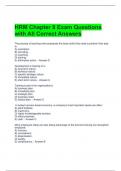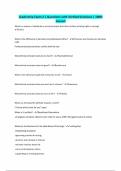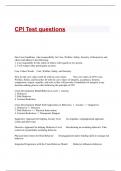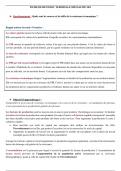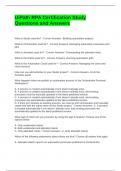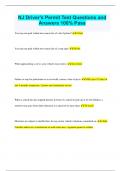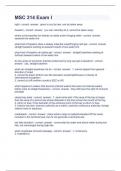Lecture 1: Overview of Financial Management in
Multinational Companies (MNC)
Theories of International Business:
1) Theory of Comparative Advantage
2) Imperfect Markets Theory
3) Product Cycle Theory
International Business Methods
1) International trade
2) Licensing (allows a firm to provide its technology in exchange for fees or other)
3) Franchising
4) Joint venture (joint ownership and operation)
5) Acquisitions of existing operations
6) Establishing new foreign subsidiaries
Many MNC’s use a combination of methods to increase international business. The optimal
method for a firm to penetrate a foreign market is partially dependent on the characteristics
of the market.
The international environment introduces new opportunities and challenges. Internationalisa-
tion however introduces other tax systems, exchange rates, regulatory environments, and
political systems. The goal of the MNC’s:
Fundamentally, financial objectives of the firm do not change in a global environment.
Commonly accepted goal of maximising shareholder wealth
Generally companies would go abroad: to diversify operations, boost revenues,
reduce cost, and to avoid political, trade an regulatory barriers.
Benefits of International Diversification (sheet 17) constraints (factors that could affect
cash flows and/or cost of capital):
Agency problems
o The impact of Management Control
o The impact of Corporate Control
o The impact of Environmental, Regulatory and Ethical constraints
Expected result is to positively affect firm’s share price
o A survey by McKinsey & Co (2002) suggest that investors are willing to pay
18% to 27% more for shares of companies that exhibit high corporate
governance and ethical standards.
Exposure to international risks such as; exchange rate movements, foreign
economies and political risk
Valuation Model for a MNC (Sheet 31)
Domestic Model
International Model
Should we or should we not?
Investing in a foreign country has both opportunities and risks
Before investment, the potential benefits must be weighed against the costs and risk
associated with that specific country
MNC want to review the foreign country’s economic growth and other macroeconomic
indicators, as well as the political structure and policy issues.
1
,Lecture 2: International Financial Markets
Motives for Using International Financial Markets
1) Markets for real or financial assets are prevented from full integration by barriers.
These market imperfections create unique opportunities.
2) Investors invest in foreign markets:
a. To take advantage of favourable economic conditions
b. When they expect foreign currencies to appreciate against their own
c. To reap the benefits of international diversification
3) Creditors provide credit in foreign markets
a. To capitalize on higher foreign interest rates
b. When they expect foreign currencies to appreciate against their own
c. To reap the benefits of international diversification
4) Borrowers borrow in foreign markets
a. To capitalize on lower foreign interest rates
b. When they expect foreign currencies to depreciate against their own
The Foreign Exchange Market (Forex)
A foreign exchange transaction is an agreement between a buyer and a seller that a
fixed amount of one currency will be delivered for some other currency at a date.
The Forex market consists of two tiers:
o The interbank or wholesale market (multiples of $1MM US or equivalent in
transaction size)
o The retail market (specific, smaller amounts)
Participants include: banks and nonbank foreign exchange dealers, individuals and
companies, and central banks and treasuries.
Spot, forward and swap transactions
Foreign exchange rate quotations
Direct quotation (€/FC), number of units of home currency per 1 foreign currency
Indirect quotation (FC/€), number of units foreign currency per 1 home currency
Bid and offer rates
o A bid is the price in one currency at which a dealer will buy another currency
o An ask is the price at which a dealer will sell the other currency
A spread is the difference between bid and offer rates
o Ask rate – bid rate / ask rate = bid/ask spread
o Dealers bid (buy) at one price and ask (sell) at a slightly higher price, making
profit from the spread between the buying and selling prices.
o Spread on currency quotations is positively influenced by: order costs,
inventory costs and currency risks. Negatively influenced by: competition and
size of transactions.
o Spread is higher for “retail” transactions than for “wholesale” transactions.
Cross rate is the exchange rate determined through their relationship to a widely
traded currency, since many currency pairs are only inactively traded.
o S.A. Rand/HK$ = (S.A. Rand/£) / (HK$/£)
o Cross rates can be used to check on opportunities for inter-market arbitrage.
When the exchange rates of the currencies are not in equilibrium,
triangular arbitrage will force them back into equilibrium (sheet 27).
2
,Forward Market
An agreement between two parties (bank – customer) to exchange a specified
amount of a currency at a specified exchange rate on a specified date in the future.
When a company anticipates future need or future receipt of a foreign currency, it can
set up a forward contract to lock in the exchange rate, called hedging. Normally not
executed or used by retail consumers of small firms.
Premium/discount on forward exchange rates:
o Direct forward prem/disc = (Forward rate / Spot rate)(12/N)-1
o Indirect forward prem/disc = (Spot rate / Forward rate)(12/N)-1
Other International Markets
International Money Market, financial institutions serve MNCs by accepting deposits
and offering loans in variety of currencies for short periods <1 year.
International Credit Market, long-term, sometimes a single bank is unwilling or unable
to lend amount needed, they organize a syndicate of banks to underwrite the loan.
International Bond Market, two types:
o Foreign or parallel bonds, denominated in the currency of the country where
they are placed but issued by borrowers foreign to the country.
o Eurobonds, sold in other countries than the country of the currency
denominating the bonds.
International Stock Markets, in order to enhance the firms’ image and name
recognition, and diversify their shareholder base. Local market may be to small.
3
, Lecture 3: Determinants of foreign and exchange rate
systems
Factors that Influence Exchange Rates Equilibrium (sheet p.45)
UK inflation ↑ relative to US inflation ⇒ ↑ UK demand for US goods, and hence supply
of £ ⇒ ↓ US desire for UK goods, and hence demand for £.
o An increase in domestic inflation causes the domestic currency to depreciate.
UK real interest rate ↑ relative to US rates ⇒ ↑ US demand for British bank deposits,
and hence £ ⇒ ↓ British desire for US bank deposits, and hence the supply of £.
o Increase in domestic real interest rate causes domestic currency to appreciate
US income level ↑ relative to the UK ⇒ ↑ US demand for British goods, and hence £
⇒ No expected change for the supply of £.
Government controls: imposing foreign exchange barriers, foreign trade barriers,
intervening in the forex market, and affecting macro variables, such as, three above.
Trade-Related Factors Financial Factors
1. Inflation Differential 1. Interest Rate Differential
2. Income Differential 2. Capital Flow Restrictions
3. Government Trade Restrictions
Exchange rate systems
Fixed, rates are either held constant or fluctuate within narrow boundaries
o Pros: Work becomes easier for the MNCs
o Cons: Governments may revalue and devalue its currency
o Cons: Each country may become more vulnerable to economic conditions
o Cons: Possible restrictions on capital flows if currency is overvalued
Freely floating, exchange rates are determined solely by market forces
o Pros: Insulation against the economic problems in other countries
o Pros: Central bank interventions are no longer needed
o Pros: Governments are not restricted by exchange rate boundaries when
setting new policies
o Pros: Less capital flow restrictions are needed
o Cons: MNCs may need to devote substantial resources to managing their
exposure to exchange rate fluctuations
o Cons: The country that initially experiences economic problems (such as high
inflation, increasing unemployment rate) may have its problems compounded.
Managed Float, move freely on daily basis, however, government may intervene
o Raising interest rates attract foreign capital and strengthen the currency
o Cons: Enables governments to influence exchange rates such that its own
country benefits at the expense of others.
Pegged, home currencies value is pegged to a foreign currency
The perfect currency is called “Impossible Trinity”, since it is impossible to achieve:
- A fixed exchange rate
- Free capital movement
- An independent monetary policy
Dollarization occurs when a country abandons its own currency and adopts the U.S. dollar
as its legal tender. Country could also use the euro for instance. Benefits:
Adopted currency is more stable
Monetary and exchange rate policy is taken out of the hand of local politicians.
4
Multinational Companies (MNC)
Theories of International Business:
1) Theory of Comparative Advantage
2) Imperfect Markets Theory
3) Product Cycle Theory
International Business Methods
1) International trade
2) Licensing (allows a firm to provide its technology in exchange for fees or other)
3) Franchising
4) Joint venture (joint ownership and operation)
5) Acquisitions of existing operations
6) Establishing new foreign subsidiaries
Many MNC’s use a combination of methods to increase international business. The optimal
method for a firm to penetrate a foreign market is partially dependent on the characteristics
of the market.
The international environment introduces new opportunities and challenges. Internationalisa-
tion however introduces other tax systems, exchange rates, regulatory environments, and
political systems. The goal of the MNC’s:
Fundamentally, financial objectives of the firm do not change in a global environment.
Commonly accepted goal of maximising shareholder wealth
Generally companies would go abroad: to diversify operations, boost revenues,
reduce cost, and to avoid political, trade an regulatory barriers.
Benefits of International Diversification (sheet 17) constraints (factors that could affect
cash flows and/or cost of capital):
Agency problems
o The impact of Management Control
o The impact of Corporate Control
o The impact of Environmental, Regulatory and Ethical constraints
Expected result is to positively affect firm’s share price
o A survey by McKinsey & Co (2002) suggest that investors are willing to pay
18% to 27% more for shares of companies that exhibit high corporate
governance and ethical standards.
Exposure to international risks such as; exchange rate movements, foreign
economies and political risk
Valuation Model for a MNC (Sheet 31)
Domestic Model
International Model
Should we or should we not?
Investing in a foreign country has both opportunities and risks
Before investment, the potential benefits must be weighed against the costs and risk
associated with that specific country
MNC want to review the foreign country’s economic growth and other macroeconomic
indicators, as well as the political structure and policy issues.
1
,Lecture 2: International Financial Markets
Motives for Using International Financial Markets
1) Markets for real or financial assets are prevented from full integration by barriers.
These market imperfections create unique opportunities.
2) Investors invest in foreign markets:
a. To take advantage of favourable economic conditions
b. When they expect foreign currencies to appreciate against their own
c. To reap the benefits of international diversification
3) Creditors provide credit in foreign markets
a. To capitalize on higher foreign interest rates
b. When they expect foreign currencies to appreciate against their own
c. To reap the benefits of international diversification
4) Borrowers borrow in foreign markets
a. To capitalize on lower foreign interest rates
b. When they expect foreign currencies to depreciate against their own
The Foreign Exchange Market (Forex)
A foreign exchange transaction is an agreement between a buyer and a seller that a
fixed amount of one currency will be delivered for some other currency at a date.
The Forex market consists of two tiers:
o The interbank or wholesale market (multiples of $1MM US or equivalent in
transaction size)
o The retail market (specific, smaller amounts)
Participants include: banks and nonbank foreign exchange dealers, individuals and
companies, and central banks and treasuries.
Spot, forward and swap transactions
Foreign exchange rate quotations
Direct quotation (€/FC), number of units of home currency per 1 foreign currency
Indirect quotation (FC/€), number of units foreign currency per 1 home currency
Bid and offer rates
o A bid is the price in one currency at which a dealer will buy another currency
o An ask is the price at which a dealer will sell the other currency
A spread is the difference between bid and offer rates
o Ask rate – bid rate / ask rate = bid/ask spread
o Dealers bid (buy) at one price and ask (sell) at a slightly higher price, making
profit from the spread between the buying and selling prices.
o Spread on currency quotations is positively influenced by: order costs,
inventory costs and currency risks. Negatively influenced by: competition and
size of transactions.
o Spread is higher for “retail” transactions than for “wholesale” transactions.
Cross rate is the exchange rate determined through their relationship to a widely
traded currency, since many currency pairs are only inactively traded.
o S.A. Rand/HK$ = (S.A. Rand/£) / (HK$/£)
o Cross rates can be used to check on opportunities for inter-market arbitrage.
When the exchange rates of the currencies are not in equilibrium,
triangular arbitrage will force them back into equilibrium (sheet 27).
2
,Forward Market
An agreement between two parties (bank – customer) to exchange a specified
amount of a currency at a specified exchange rate on a specified date in the future.
When a company anticipates future need or future receipt of a foreign currency, it can
set up a forward contract to lock in the exchange rate, called hedging. Normally not
executed or used by retail consumers of small firms.
Premium/discount on forward exchange rates:
o Direct forward prem/disc = (Forward rate / Spot rate)(12/N)-1
o Indirect forward prem/disc = (Spot rate / Forward rate)(12/N)-1
Other International Markets
International Money Market, financial institutions serve MNCs by accepting deposits
and offering loans in variety of currencies for short periods <1 year.
International Credit Market, long-term, sometimes a single bank is unwilling or unable
to lend amount needed, they organize a syndicate of banks to underwrite the loan.
International Bond Market, two types:
o Foreign or parallel bonds, denominated in the currency of the country where
they are placed but issued by borrowers foreign to the country.
o Eurobonds, sold in other countries than the country of the currency
denominating the bonds.
International Stock Markets, in order to enhance the firms’ image and name
recognition, and diversify their shareholder base. Local market may be to small.
3
, Lecture 3: Determinants of foreign and exchange rate
systems
Factors that Influence Exchange Rates Equilibrium (sheet p.45)
UK inflation ↑ relative to US inflation ⇒ ↑ UK demand for US goods, and hence supply
of £ ⇒ ↓ US desire for UK goods, and hence demand for £.
o An increase in domestic inflation causes the domestic currency to depreciate.
UK real interest rate ↑ relative to US rates ⇒ ↑ US demand for British bank deposits,
and hence £ ⇒ ↓ British desire for US bank deposits, and hence the supply of £.
o Increase in domestic real interest rate causes domestic currency to appreciate
US income level ↑ relative to the UK ⇒ ↑ US demand for British goods, and hence £
⇒ No expected change for the supply of £.
Government controls: imposing foreign exchange barriers, foreign trade barriers,
intervening in the forex market, and affecting macro variables, such as, three above.
Trade-Related Factors Financial Factors
1. Inflation Differential 1. Interest Rate Differential
2. Income Differential 2. Capital Flow Restrictions
3. Government Trade Restrictions
Exchange rate systems
Fixed, rates are either held constant or fluctuate within narrow boundaries
o Pros: Work becomes easier for the MNCs
o Cons: Governments may revalue and devalue its currency
o Cons: Each country may become more vulnerable to economic conditions
o Cons: Possible restrictions on capital flows if currency is overvalued
Freely floating, exchange rates are determined solely by market forces
o Pros: Insulation against the economic problems in other countries
o Pros: Central bank interventions are no longer needed
o Pros: Governments are not restricted by exchange rate boundaries when
setting new policies
o Pros: Less capital flow restrictions are needed
o Cons: MNCs may need to devote substantial resources to managing their
exposure to exchange rate fluctuations
o Cons: The country that initially experiences economic problems (such as high
inflation, increasing unemployment rate) may have its problems compounded.
Managed Float, move freely on daily basis, however, government may intervene
o Raising interest rates attract foreign capital and strengthen the currency
o Cons: Enables governments to influence exchange rates such that its own
country benefits at the expense of others.
Pegged, home currencies value is pegged to a foreign currency
The perfect currency is called “Impossible Trinity”, since it is impossible to achieve:
- A fixed exchange rate
- Free capital movement
- An independent monetary policy
Dollarization occurs when a country abandons its own currency and adopts the U.S. dollar
as its legal tender. Country could also use the euro for instance. Benefits:
Adopted currency is more stable
Monetary and exchange rate policy is taken out of the hand of local politicians.
4

